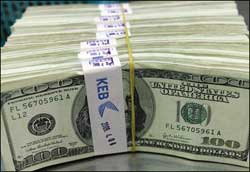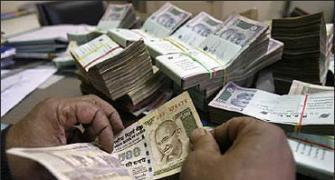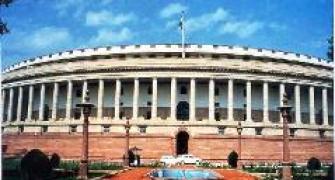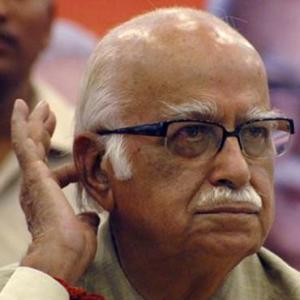Can a corrupt revenue system be trusted to keep confidences when oodles of money are involved, asks Mahesh Vijapurkar
 The other day, when Bharatiya Janata Party leader L K Advani moved an adjournment motion on black money in the Lok Sabha, the debate that followed did not carry any conviction.
The other day, when Bharatiya Janata Party leader L K Advani moved an adjournment motion on black money in the Lok Sabha, the debate that followed did not carry any conviction.
Why?
This is not a rhetorical question. It has to be asked of the members of Parliament by the people.
It did not convince the people about the MPs' seriousness and here is why.
For instance, the wording of the adjournment motion is a dead giveaway. It centred on "the situation arising out of money deposited illegally in foreign banks and action taken against guilty persons". It was limited to what had been spirited away and squirreled away overseas in tax havens.
There was no mention of the money that has sidestepped the legitimate economy and runs on its own steam. It is enough, we have been told time and again, to add one or two percentage points to India's GDP growth every year. This is an economy that has not -- and perhaps is not -- easy to assess for size.
And not all of the money that escapes the taxman has gone overseas. Even if the money that has been shifted abroad is huge, that which lingers in India is perhaps larger. They may not always be big-ticket numbers in each individual case. What the policeman takes, what the tahsildar steals from you for giving you your legitimate due, what the municipal contractors grabs and shares with the petty politician add up to something that can choke the horses in all the cavalries of your past and present.
What about that?
It is nobody's case that what lies hidden outside India ought to be bypassed and the focus should be shifted to the internal accruals of black money. This domestic loot inside India is running things in the country, from businesses to politics. This is what is queering the pitch for the common man, ensuring that he is at a disadvantage; that he is somewhere lower down the rung because he cannot pay the extra buck which the black system demands.
Anna Hazare's campaign caught the fancy of the middle classes because he knows that the big businesses have been as corrupt as the small-time babu, except in terms of numbers of currency notes and their denominations. It is this that is hurting the common man and it is here the politician steps into the picture. He wants to amass wealth and he involves the bureaucrat. He asks the latter to collect for him or he collects from a client and asks the bureaucrat to bend the rule, hasten a process or wink at an irregularity.
That is why when politicians talk about corruption, which is not just near-endemic but endemic, people are not amused.
People have believed in the past, when they propelled V P Singh on the plank of anti-corruption against Rajiv Gandhi. The target remained Rajiv Gandhi, not corruption. If a government could be brought down, citing the Bofors scandal as a symptom of a deep-rooted malaise, others who followed did not remain saints.
Each of them fought elections; each of them needed cash -- as opposed to legitimate money -- to better their rivals. Talking about cleansing the system doesn't suit them.
Finance Minister Pranab Mukherjee's assertion that neither he nor his party are protecting black money holders would be incredulous. What gave up the game was his statement that since black money had been accumulating since 1948, "what was the hurry now"?
Against such a background, his perfectly valid justification -- that due processes needed to be observed since international treaties were involved and he could not simply send forces to recover the black money overseas -- doesn't seem credible to the common man.
The anxiety shown by Advani is matched by all those who pay taxes. It must have shocked them when Congress spokesperson Manish Tiwari put a figure to it: rupees one trillion in foreign banks.
Congress leader Shashi Tharoor referred to it being, as per someone's estimate, 20 times India's GDP.
The system is so far gone into disrepute with the citizens that any suggestion that the names were being withheld -- pending the completion of due processes to secure the assets -- raises eyebrows. Can a corrupt revenue system be trusted to keep confidences when oodles of money are involved? After all, this system works on quid pro quos and a helpful hint means a lot to the tax man.
Ministers sitting behind Mukherjee had smiled -- probably others did too, but the Lok Sabha TV did not pan at that moment -- when he said he did not find a single MP's name on the list of people holding black money.
Ask the sceptics what they think. It is unlikely that they will agree with the honourable finance minister. For, the trust deficit, notwithstanding claims to good deeds, is so enormous that the debate may as well have not been held at all.
That is the common man's logic. Can't beat it.









